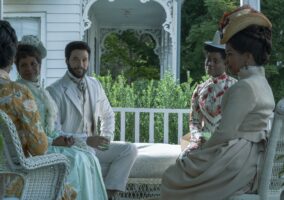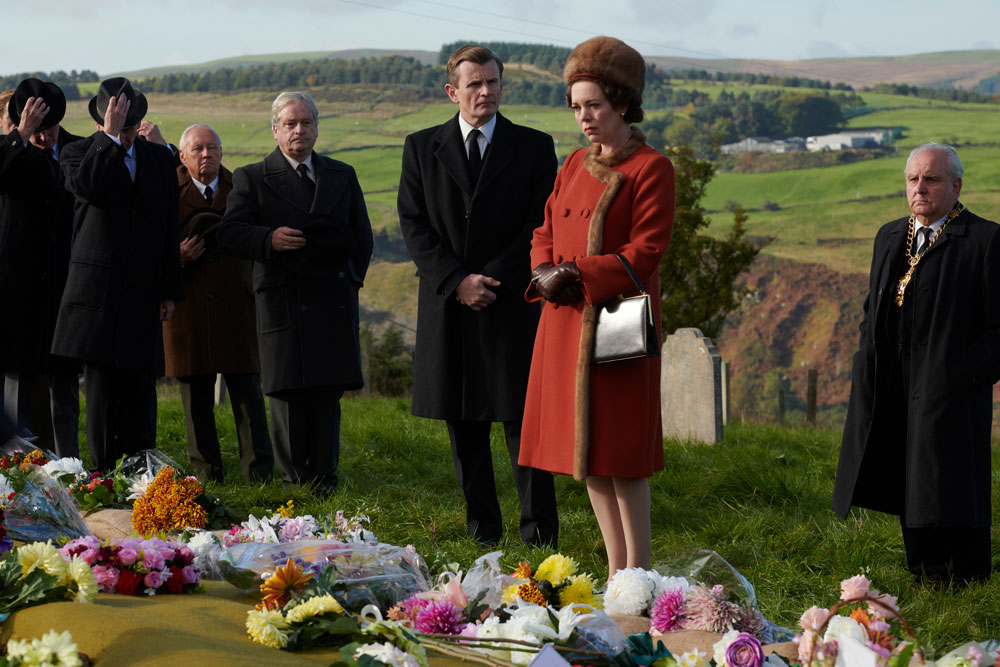
With the third and fourth episodes of season 3, and the new cast now more or less firmly established, show creator and writer Peter Morgan got down to some of his favorite recurring themes, allowing that new cast to continue some of the character work laid down by their predecessors. We already know that Elizabeth has trouble relating to the world around her in an emotional way – including some relationships in her own immediate family – and we know that Philip suffered a bizarrely damaging childhood. We know that the family struggles constantly with trying to divine the public’s expectations of them. As we noted in the previous review, you have to work with the subjects you’re writing about, which means if you’re trying for any verisimilitude or continuity of character, you’re going to wind up returning to the same issues and themes in the writing, just as most of us do in our own lives. Having said that, Morgan has some distinct ideas about the family, the monarchy, and Elizabeth specifically that we tend to take with a light sprinkling of salt. The Crown is a highly dramatized take on the personal and political history of the British royal family during Elizabeth’s reign and it’s always good to remember just how much Morgan excels at wringing intensely personal emotional scenes by extrapolating from historical events. This isn’t some sneering “You guys know it’s all fake, right?” take on our parts. On the contrary; Morgan’s ability to find such powerful and relatable moments is one of our favorite parts of the show. The Crown isn’t a documentary or a historical document and we’ve never taken it as such.
“What, precisely, would you have me do?”
“Go and comfort people.”
“Put on a show? The crown doesn’t do that.”
“I didn’t say ‘put on a show.’ I said ‘comfort people.'”
Peter Morgan loves to thread the needle on criticizing the Queen while at the same time defending and exalting her. “Aberfan” was essentially a companion piece (if we’re being kind) or a ripoff (if we’re not) of Morgan’s 2006 film The Queen, which was largely turned over to the same themes of the Queen being cold toward her subjects only to reveal that she is secretly much warmer than we thought. In the case of the Aberfan disaster, the Queen’s regret over how she handled it is fairly well-documented as is her commitment to returning to the community over the years.
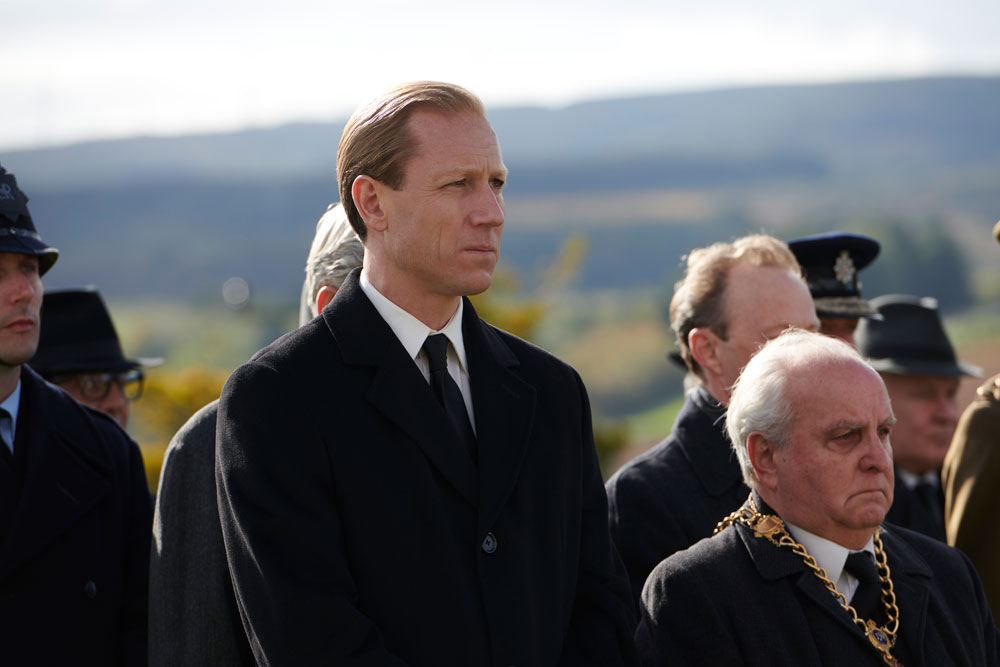
The opening minutes of the show depicting the community and families about to be visited by tragedy were beautiful and horrifying, making for a sobering opening to the episode. “Aberfan” is one of the series’ finest hours and demonstrates high-level filmmaking, acting and screenwriting in service to a deeply emotional story. When the episode is focused on the people of the disaster, as the first several minutes are, it’s some of the best television seen all year. Even when the focus shifts over to Elizabeth and her family’s reaction to it, the script, direction and acting all remain top notch. Colman, Jason Watkins as Harold Wilson, and Tobias Menzies were all excellent. And Sinead Matthews as the Prime Minister’s secretary Marcia Williams tore the roof off in a scene that nearly steals the entire episode out from under everyone else (while causing countless Americans to go off and Google “Who was that amazing ball-buster on The Crown?”)
Having said all of that, we do tend to think some of the family’s reactions – Margaret’s tearful recounting of the scene from Tony, Philip proclaiming that he was torn into a thousand pieces, and finally, Elizabeth’s one, highly dramatic tear (hats off to Colman for the impressive technical feat) all felt just a weensy bit like Morgan gilding the lily and making the family out to be a bit more empathetic and emotional behind the scenes than the show – and reality – has ever led us to believe. We admired his boldness in having Elizabeth admit that she’s cold and that the fact of that quality has bothered her for the entirety of her life – but if you end the episode with a closeup on her tear-streaked face, you’re somewhat countering that boldness and trying to have it both ways.
“Tell me. It’s all any of us want to know. What do you want from us?”
“Bubbikins” was another great hour and another set of chances for Morgan to return to some old themes while exalting the royal family. Like “Aberfan,” it was an episode helped tremendously by some unexpected performances; first Jane Lapotaire giving a marvelously tender, funny, and other-worldly performance as Princess Alice and Erin Doherty, getting one hell of an introduction as Princess Anne. Lapotaire is simply wonderful as Alice; giving her the interior-focused air that speaks of her deafness, her mental health difficulties and her intense spirituality all at once, only to snap to focus immediately when she feels the need to offer the appropriate observations. She feels like a creature from another world – indeed, Philip dismisses her unkindly as “She’s not of our world, nor, frankly, suited to it.” – but Lapotaire’s performance has an underlying aristocratic tone that subtly indicates just how much of a palace insider she really is, deep down.
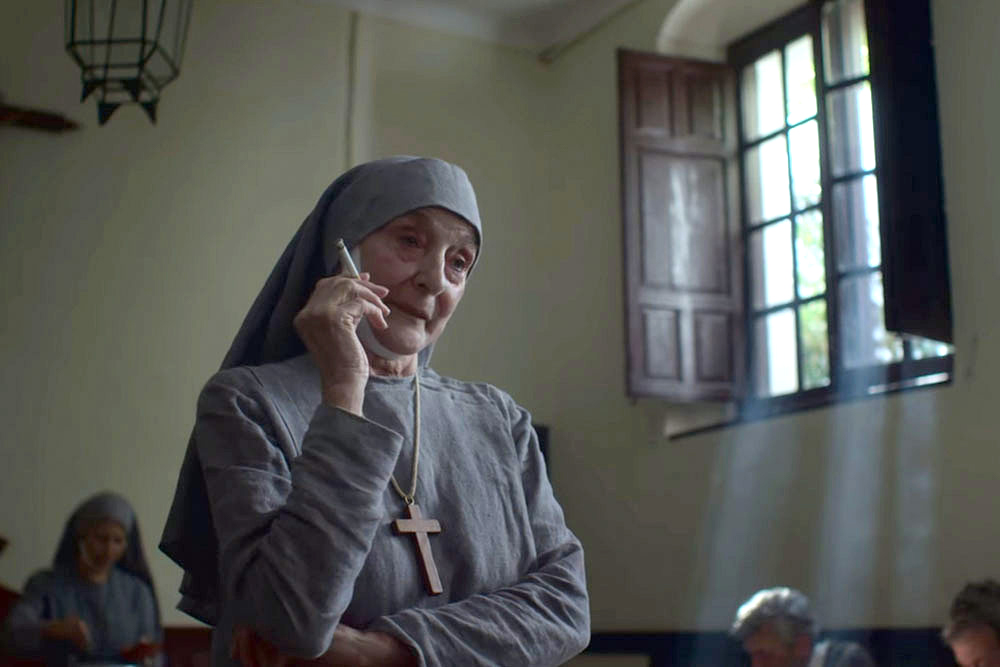
One of the subtler themes of the series is the persistence of family ties; how histories play out again and again in families. We saw a bit of this articulated in “Margaretology” when Philip told Elizabeth that the Windsor family will always have one dutiful member and one wild one in the same generation. We see this play out a little cleverly in this episode; just as Alice taunts the pawn shop owner who called the cops on her with “Did you come up with a price yet, sweetie?” The scene then cuts to Philip calling out for his sweetie (who is not Elizabeth, as she’s “darling” or “cabbage”) over the palace intercom. This sweetie turns out to be Princess Anne, who, in continuing the motif of family repetition, turns out to be a near mirror-image of Philip, all sharp tongue and harsh opinions of everyone around her. In the two months since we first gained access to the screeners for this season, keeping the secret of Erin Doherty under wraps was the hardest part. She is perfectly cast and perfectly captures Anne’s particular haughtiness and admirable sense of herself in a family that didn’t see fit to define her.
“You deserve to be paid properly. We deserve to be paid properly,” Philip tells Elizabeth, giving the game away. He calls Anne “good value for the money,” to which she archly replies “Like a pair of long-lasting boots.” Philip’s disastrous remarks on Meet the Press and his obsession to prove that the family “provides value” that requires compensation isn’t at all about money (which they clearly don’t need any more of) but about his long-lasting insecurities about his own lack of career. Elizabeth is largely indulgent of him because of that insecurity, but it’s interesting to note how she immediately and without a second’s hesitation overrules him and has his mother flown to England. Her indulgences go only so far and when she wants or needs to, she’s able to invoke herself as the final word in the family. To Philip’s credit, he only gets mildly frustrated with her about it. One of the best things about this season is how well it depicts a healthy, mature marriage.
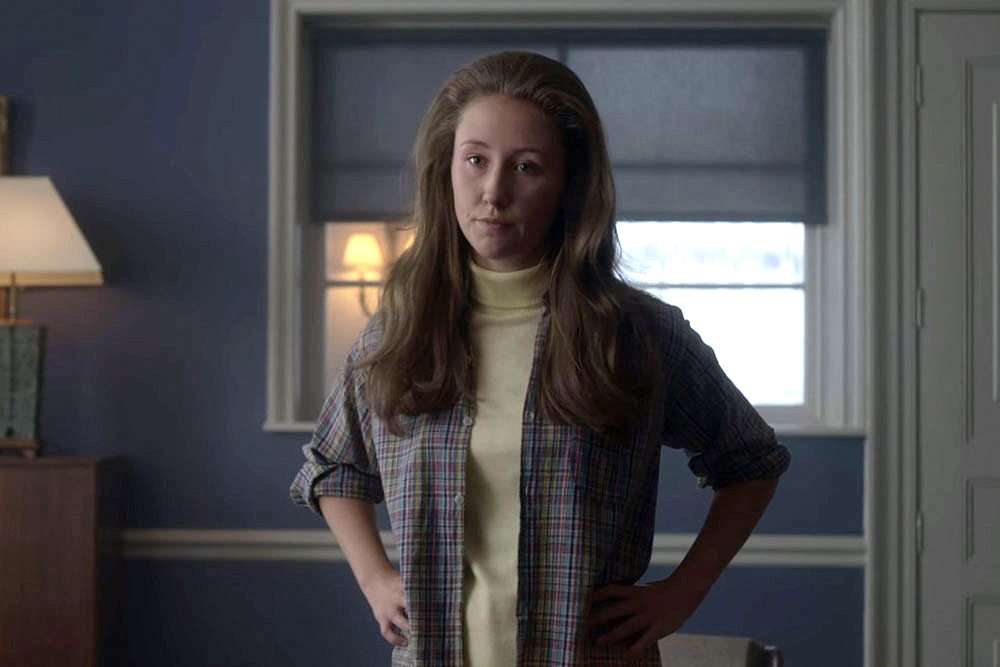
But because the focus of the series is becoming more expansive with each season (we can’t imagine how they’re going to juggle Thatcher and Diana in season four without giving one of them short shrift), many of the episodes this season feel like they’re trying to do a bit too much at once. Not only are we revisiting Philip’s past and expanding our understanding of his family (and why he is the way he is), but we’re also being introduced to Princess Anne AND dealing with a running subplot about the public turning against the royal family, AND spotlighting the family’s disastrous television documentary, AS WELL AS revisiting Philip’s insecurities about his role in life, while ALSO allowing Elizabeth some time to get pissed off at trying to juggle all this nonsense and inadvertently defining a thousand years of European royalty while in a fit of pique: “The smoke and mirrors, the mystery and ritual – it’s not there to keep us apart, it’s there to keep us alive.”
Again, Morgan gilds the lily a bit in discussing or portraying the royal family’s finer qualities. The journalist and the article quoted in the episode are both fictional, which makes some of the soaring rhetoric describing Alice’s life – which really was that extraordinary – come off a bit overdone, as does Philip’s near prostration at her feet in the last minutes. Once again, Morgan shows a member of the family to be deeply flawed on an emotional level only to give them a redemptive scene in the final moments of the episode. This is something you sort of have to accept with The Crown; something that feels like it’s becoming a bit more obvious as the cast ages closer to our modern understanding of the people they’re playing. We have decades of material showing the family in a certain light – a certain out-of-touch, emotionally distant light – that plays against the tenets of conventional drama, if you’re trying to cast them as the protagonists in the story. In other words, it would be easier for Morgan to simply let them all look completely foolish and repressed, but he truly wants to present a fuller picture of these icons as rounded, emotional beings. That he occasionally might tip over into hagiography isn’t the worst crime in the world so long as you remember how interpreted some of these events actually are.
Costume watch: A lot of the costumes this time around were based entirely on publicly worn ensembles, like Elizabeth’s fur hat and fur-trimmed coat in Aberfan, but one of our favorite, possibly coincidental bits of costume symbolism came in the scene where Elizabeth informed Michael Adean that she would like for the family documentary to disappear and never air again. Her blouse? A print of hundreds of little rectangles, little television screens swarming all over her.
Chadwick Boseman and Stephan James at the “21 Bridges” New York Special Screening Next Post:
Elizabeth Banks, Kristen Stewart, Ella Balinska and Naomi Scott at the “Charlie’s Angels” London Premiere
Please review our Community Guidelines before posting a comment. Thank you!


